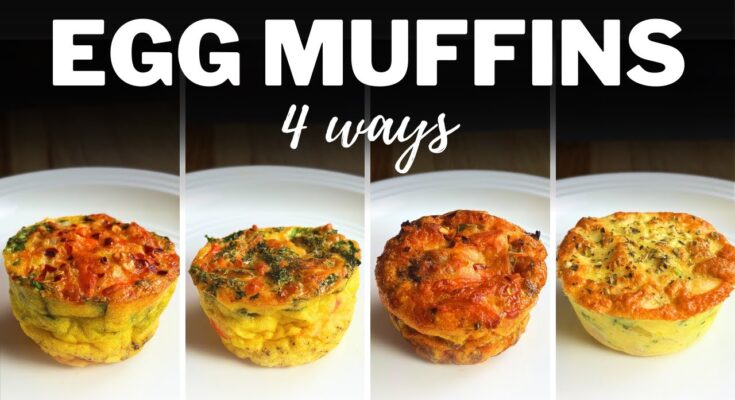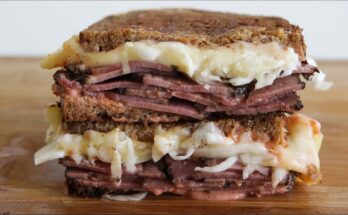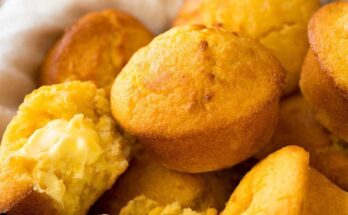Egg Cups Recipe: Egg cups are the perfect answer to the “what’s for breakfast?” dilemma that hits us all from time to time. They’re a fuss-free, customizable, and protein-packed meal that you can prep ahead of time and enjoy on busy mornings. Whether you’re a parent trying to get the kids out the door, someone running late for work, or just a fan of delicious breakfast food, egg cups have got your back.
They’re basically mini frittatas baked in a muffin tin—super portable, incredibly versatile, and can be made with ingredients you probably already have in your fridge. And the best part? You don’t need to be a professional chef to make these.
Why Egg Cups Are So Popular
Egg cups are like the Swiss army knife of breakfast foods. You can make them with just eggs and a pinch of salt, or go wild and add cheese, veggies, bacon, sausage—you name it. Plus, they’re great for meal prepping. Make a batch on Sunday and enjoy them throughout the week.
And let’s not ignore the health-conscious folks. If you’re watching your carbs, these are a dream come true. You can keep it low-carb, gluten-free, and dairy-free based on what you choose to add.
Nutritional Benefits of Egg Cups
Here’s where egg cups shine nutritionally:
- High in protein – Keeps you full for longer.
- Low in carbs – Perfect for keto or low-carb diets.
- Customizable nutrition – Add spinach, mushrooms, or bell peppers for added fiber and vitamins.
- Portion controlled – Easy to track for calorie-conscious eaters.
With all those benefits packed in a tiny muffin-sized bite, egg cups are not just a tasty choice—they’re a smart one too.
Ingredients You’ll Need
Base Ingredients
Let’s get you started with the basics. These ingredients are essential for any egg cup recipe:
- 6 large eggs
- Salt and pepper to taste
- 1/4 cup milk (optional for fluffiness)
That’s your base. These alone will give you fluffy, golden egg cups.
Optional Add-ins for Flavor
Now let’s spice things up. Here are some delicious extras to mix and match:
- Cheese: Cheddar, mozzarella, feta, or goat cheese.
- Vegetables: Spinach, bell peppers, mushrooms, onions, tomatoes.
- Proteins: Bacon bits, ham, cooked sausage, or shredded chicken.
- Herbs and spices: Basil, parsley, paprika, garlic powder, or chili flakes.
Get creative here! Just chop everything finely so they mix well with the eggs and bake evenly.
Equipment You’ll Need
Kitchen Tools Checklist
Good news—no fancy tools required. Just the basics:
- Muffin tin (12-cup)
- Mixing bowl
- Whisk or fork
- Measuring cup
- Non-stick spray or muffin liners
- Spatula or spoon
If you’ve got these, you’re all set to whip up some killer egg cups.
How to Make Egg Cups – Step-by-Step Instructions
Now, let’s walk through this recipe step-by-step so your egg cups come out picture-perfect.
Step 1 – Preheat and Prep
Set your oven to 375°F (190°C) and let it preheat. While it’s warming up:
- Spray your muffin tin with non-stick spray or line it with silicone liners. Trust me, you don’t want to be scraping egg from the pan later.
- Chop all your fillings—veggies, meats, herbs—into small, even pieces.
This step sets the stage. You want everything ready to go before the eggs hit the oven.
Step 2 – Whisking the Eggs
In a large mixing bowl, crack in your 6 eggs. Add:
- A splash of milk if you like them extra fluffy.
- Salt and pepper to taste.
Whisk it all together until it’s smooth and slightly frothy. This creates a nice, airy texture when baked.
Step 3 – Add Fillings to Muffin Tin
Spoon your desired add-ins into each muffin cup. Don’t go overboard—fill about 1/3 of each cup with the extras. This leaves enough room for the eggs to puff up without spilling over.
A good combo might be:
- Spinach + tomato + feta
- Ham + cheddar + green onion
- Mushroom + mozzarella + basil
Step 4 – Pour in the Egg Mixture
Now, carefully pour your egg mixture into each muffin cup, filling them about 3/4 full. The eggs will rise slightly as they bake, so don’t fill to the top.
Use a spoon to gently stir each cup so the fillings are evenly distributed.
Step 5 – Bake to Perfection
Pop your muffin tin in the oven and bake for 18–22 minutes, or until:
- The eggs are set in the center
- The tops are slightly golden
Let them cool for 5 minutes before removing from the tin. They’ll deflate a bit—that’s totally normal.
Tips for Perfect Egg Cups Every Time
If you want those fluffy, flavorful egg cups every single time, here are a few pro tips:
- Don’t overfill the cups: Always leave room for the eggs to rise. Going too full will lead to overflow and uneven cooking.
- Use fresh ingredients: Fresh veggies, quality cheese, and good eggs make all the difference in taste.
- Grease well or use liners: This prevents sticking and makes cleanup a breeze.
- Cool before storing: If you’re meal-prepping, let your egg cups cool completely before popping them in the fridge or freezer. This avoids sogginess.
- Chop small: Dice your veggies and meats finely. Larger chunks can sink to the bottom or cause uneven cooking.
- Use silicone muffin trays: These are a game-changer. Your egg cups will slide right out, and they’re super easy to clean.
Whether you’re making them once or adding them to your weekly prep, these tips will have you making perfect egg cups like a seasoned pro.
Variations and Flavor Combinations
One of the best things about egg cups is how endlessly customizable they are. Here are some flavor combos to get your creativity flowing.
Vegetarian Egg Cups
No meat? No problem! Try these hearty and healthy combinations:
- Spinach + Mushroom + Feta
- Bell Pepper + Onion + Cheddar
- Tomato + Basil + Mozzarella
These combos are packed with nutrients and still rich in flavor. Add a pinch of garlic powder or chili flakes if you want a little extra kick.
Meaty Delights
For the meat lovers out there, try these savory options:
- Bacon + Cheddar + Jalapeño
- Sausage + Spinach + Provolone
- Ham + Swiss + Chives
Just make sure your meat is pre-cooked before adding it to the egg cups. Raw meat won’t cook properly in the short baking time.
Low-Carb or Keto Versions
Looking to keep it lean and low-carb? Stick with high-protein, high-fat options:
- Ground turkey + zucchini + Parmesan
- Chorizo + pepper jack + avocado (added after baking)
- Broccoli + cheddar + heavy cream
These options keep your macros in check while still being satisfying and flavorful.
How to Store and Reheat
Whether you’re making them ahead for the week or freezing for later, egg cups store super well.
Storage Tips
- Refrigerate: Store in an airtight container for up to 5 days.
- Freeze: Wrap each egg cup individually in plastic wrap, then place them in a ziplock bag. They’ll keep for up to 3 months.
Make sure they’re completely cooled before storing to prevent condensation, which can make them soggy.
Best Reheating Methods
Reheating egg cups is quick and easy:
- Microwave: Wrap in a damp paper towel and heat for 30-60 seconds.
- Oven or toaster oven: Preheat to 350°F and heat for 8-10 minutes for a crispier texture.
- Air fryer: Reheat at 350°F for 5-7 minutes.
Avoid over-microwaving, as it can make the eggs rubbery. A little patience goes a long way for that fresh-baked feel.
Serving Suggestions
Egg cups are incredibly versatile on their own, but if you want to elevate your breakfast game, here are some serving ideas:
- With toast or an English muffin for a more filling breakfast.
- Alongside avocado slices or guacamole for healthy fats.
- Drizzle with hot sauce or salsa for some kick.
- Pair with a smoothie or fresh fruit for a balanced meal.
- Add to a lunchbox with crackers and cheese for a protein-packed snack.
They also make great picnic or brunch items—compact, flavorful, and a guaranteed hit!
Common Mistakes to Avoid
Even though egg cups are easy, there are a few pitfalls you’ll want to dodge:
- Using raw vegetables that release water – Like tomatoes or zucchini. These can make your egg cups soggy. Sauté or pat them dry before adding.
- Skipping the grease – Egg sticks badly to muffin tins, so don’t skip the non-stick spray or liners.
- Overcooking – Leads to rubbery eggs. Keep an eye on them and remove from the oven when the center is just set.
- Uneven ingredient distribution – Stir lightly after pouring the egg to evenly spread out the fillings.
- Overfilling the cups – The eggs will puff up and can spill over. Stick to ¾ full.
Avoid these mistakes, and you’ll be making better egg cups than your favorite brunch spot.
Health Benefits of Homemade Egg Cups
Egg cups aren’t just convenient—they’re also a powerhouse of nutrition when done right. Let’s break down why adding these to your diet is a smart move.
1. High in Protein: Eggs are a fantastic source of complete protein. Each egg cup can pack in about 6–10 grams of protein depending on what fillings you use. That means you stay full longer, with fewer snack cravings later.
2. Low in Carbs: Looking to cut back on carbs? Egg cups fit perfectly into low-carb or ketogenic diets. Skip the toast and reach for an egg cup instead—they’ll give you energy without spiking your blood sugar.
3. Great for Weight Management: With the right ingredients, egg cups are low in calories and high in volume. That’s a winning combo for anyone watching their waistline. Add some veggies for fiber, and you’ve got a balanced bite in one muffin-sized meal.
4. Rich in Vitamins and Minerals: Eggs contain B vitamins, choline, selenium, and iron. Toss in some spinach or peppers, and you’re adding even more nutrients like vitamin C, K, and potassium.
5. No Preservatives or Hidden Sugars: Unlike store-bought breakfast options, homemade egg cups let you control everything that goes into them. That means no preservatives, added sugars, or unwanted fats. Just real, whole ingredients.
6. Diabetic-Friendly: Egg cups help regulate blood sugar levels due to their low carb, high protein composition. Pair them with a handful of berries or a slice of whole-grain toast for a blood-sugar-friendly breakfast.
So whether you’re on a special diet, managing a health condition, or just want to eat better, egg cups are a solid choice. They’re like the little black dress of breakfast—reliable, versatile, and always in style.
FAQs about Egg Cups Recipe
1. Can I make egg cups without dairy?
Absolutely! Just skip the cheese and milk. You can use dairy-free alternatives like almond or oat milk if you want some fluffiness, or go without—it still tastes great.
2. How long can I store egg cups in the fridge?
Egg cups can last up to 5 days in an airtight container in the fridge. Make sure they’re fully cooled before storing.
3. Can I freeze egg cups?
Yes! Wrap each cup individually, then store them in a freezer bag. They’ll stay fresh for up to 3 months. Reheat in the microwave, oven, or air fryer.
4. Why are my egg cups soggy?
It’s likely due to watery vegetables like tomatoes or zucchini. Try sautéing or drying them first. Also, don’t skip letting them cool before storing—steam can make them soggy.
5. Are egg cups good for kids?
Totally! Kids love their small, easy-to-eat size. Plus, you can sneak in some veggies for added nutrition. Just go light on the spice and make a batch with their favorite ingredients.
Conclusion
You can keep it simple with just eggs and cheese, or go gourmet with herbs, meats, and colorful veggies. They store beautifully, reheat like a dream, and give you the energy to tackle your day.
So next time you’re staring into your fridge wondering what to make, crack a few eggs and get creative. With just a little prep, you’ll have breakfast (or lunch, or snack!) ready to go.
And the best part? Once you’ve made them once, you’ll wonder how you ever lived without them.



